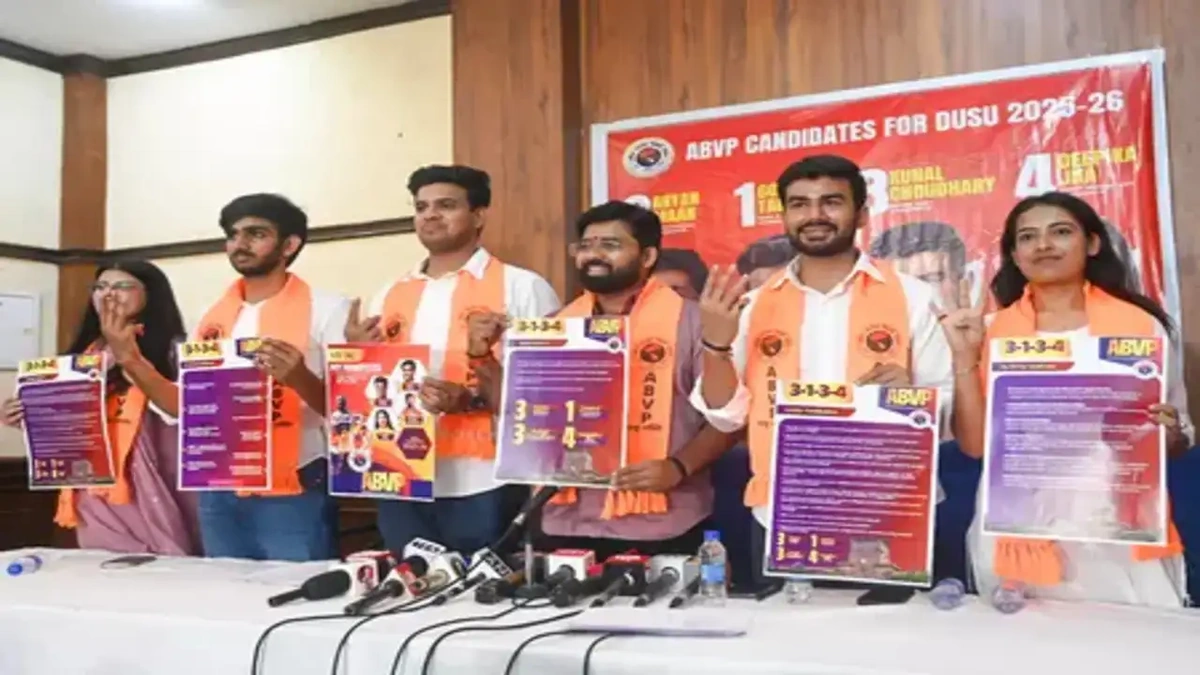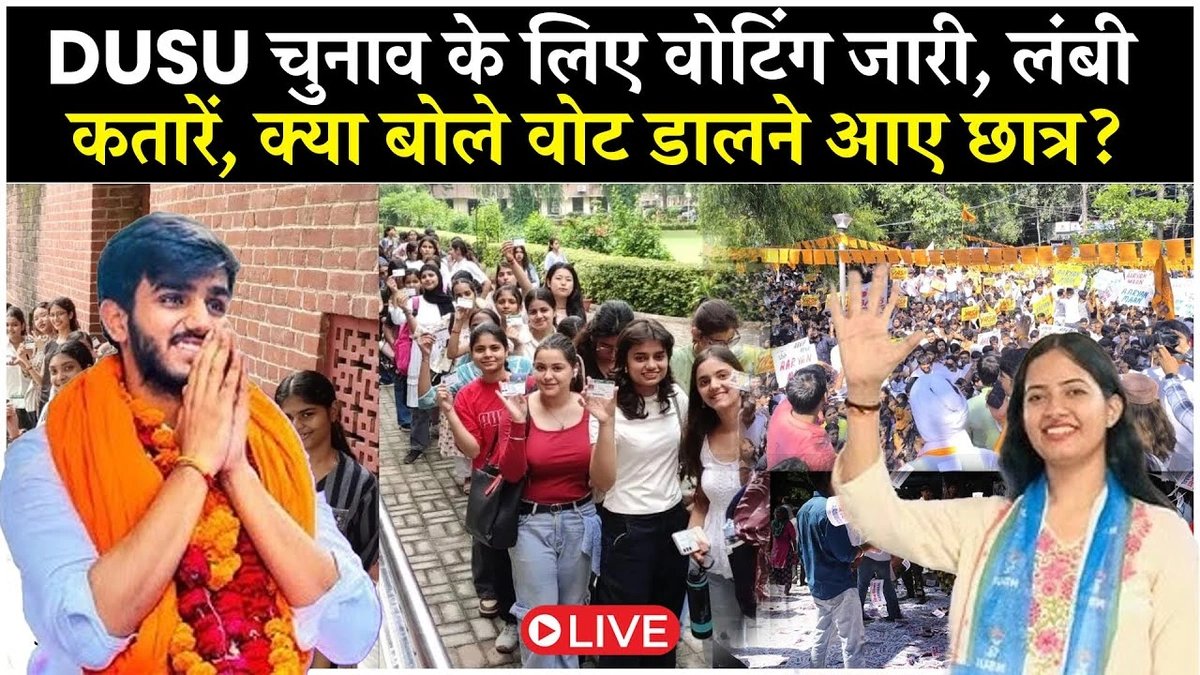Decoding DUSU | More Than Just College Elections
Alright, let’s talk about DUSU . It’s more than just those chaotic college elections you see splashed across headlines every year. What fascinates me is how it acts as a microcosm of Indian politics itself. Think about it: you have young, ambitious leaders cutting their teeth, testing strategies, and building networks that can (and often do) extend far beyond the university campus. It’s a training ground, a proving ground, and sometimes – let’s be honest – a battleground.
The Real Stakes | Why DUSU Matters

So, why should anyone outside Delhi University care about DUSU? Here’s the thing: Delhi University Student Union (DUSU) elections often foreshadow larger political trends. The issues debated, the campaigning styles adopted, and the eventual winners can provide valuable insights into the mood of the younger generation – a demographic that political parties are increasingly desperate to win over. It’s a bit like watching a stock market index – it gives you a sense of where things are headed.
And it is always buzzing with political activity. Different student political wings put up candidates, for various posts in colleges across Delhi. It’s hard work to even get your message across, but you have to do everything you can, from printing pamphlets to going class to class, requesting votes. As per reports byWikipedia, DUSU elections have been around for decades.
How to Navigate the DUSU Landscape
Okay, so you’re interested in understanding DUSU better. Where do you even start? I get it; it can be overwhelming. Let me break it down. First, familiarize yourself with the major players – ABVP (Akhil Bharatiya Vidyarthi Parishad), NSUI (National Students’ Union of India), and AISA (All India Students’ Association) are the big three. Each has a distinct ideology and approach. Understanding their platforms is crucial.
The next tip is to look beyond the noise. The media coverage often focuses on the sensational aspects – the clashes, the controversies, the celebrity endorsements. But if you want to understand the why behind DUSU , pay attention to the actual issues students are concerned about. Are they focused on better infrastructure, more transparent governance, or greater representation? These concerns reflect the broader challenges facing Indian youth. And it is a great training ground for future politicians and policymakers.
For example, let’s talk about the election process itself. According to the DUSU constitution, elections are held annually, and any student enrolled in a full-time course at Delhi University is eligible to vote. But here’s a catch: voter turnout is often low. Why? Because many students feel disillusioned with the political process or simply don’t believe that DUSU can make a real difference in their lives. Addressing this apathy is a major challenge for student leaders.
The Unseen Impact of DUSU Alumni
What fascinates me is how many DUSU alumni have gone on to achieve significant things in politics, business, and other fields. This shows that DUSU is not just some irrelevant college activity. It’s a breeding ground for future leaders. Learning to negotiate, compromise, and build consensus in the pressure cooker environment of student politics is invaluable preparation for the real world. The skills that these people learn can be extremely effective and beneficial in later life.
Consider this: many prominent politicians started their careers in DUSU. They leveraged their experience in student politics to climb the ranks of their respective parties. The ability to mobilize support, manage campaigns, and connect with voters are all skills honed in the DUSU arena. Think about the connections they make during their time in the student union. It’s a network that can prove invaluable throughout their careers.
Beyond the Surface | Ethical Considerations
But, let’s be real. It’s not all sunshine and roses. DUSU elections are often marred by controversies – allegations of corruption, misuse of funds, and even violence. These issues raise serious questions about the ethical standards of student politics and the need for greater accountability. According to sources on theDelhi Universityofficial website, authorities are trying to tackle these issues.
One of the biggest criticisms leveled against DUSU is the role of money and muscle power. Student organizations are often accused of using unfair means to influence voters, including distributing freebies and intimidating opponents. This creates an uneven playing field and undermines the integrity of the electoral process. Addressing these issues requires a multi-pronged approach, including stricter enforcement of election rules, greater transparency in campaign finance, and increased awareness among students about their rights and responsibilities.
The Future of Student Politics | What’s Next for DUSU?
So, what does the future hold for DUSU? That’s the million-dollar question. The rise of social media has undoubtedly changed the way student organizations campaign and connect with voters. But it has also created new challenges, such as the spread of misinformation and the polarization of online discourse. Navigating this new landscape will be crucial for DUSU to remain relevant.
The biggest trend that will change the face of student politics is the rise of online activism. It will become easier to spread awareness regarding pertinent social topics. With growing awareness, more and more people will be willing to change their way of life, and also come to the aid of others. Also, it is a great way to gather data, especially during election season.
Let me rephrase that for clarity: The future of DUSU depends on its ability to adapt to the changing needs and expectations of students. To be an effective voice for students, DUSU must embrace technology, promote inclusivity, and uphold the values of democracy and social justice. Ultimately, it is up to the students themselves to shape the future of their union.
In conclusion, DUSU is far from a simple college election. It is an important bellwether for Indian politics. Its echoes resonate far beyond the university campus. By understanding its dynamics, we can gain valuable insights into the future of Indian politics.
Frequently Asked Questions (FAQ)
What exactly is DUSU?
DUSU stands for Delhi University Students’ Union. It’s the representative body for students at Delhi University.
Who can vote in DUSU elections?
Any student enrolled in a full-time course at Delhi University is eligible to vote.
What if I forgot my application number?
Contact the Delhi University admissions office immediately. They can help you retrieve it.
How can I get involved in DUSU?
You can join a student organization, volunteer for a campaign, or simply attend DUSU events to learn more.
Where can I find official information about DUSU elections?
Check the Delhi University website (du.ac.in) for official notifications and guidelines.
Why is DUSU important?
DUSU provides students with a platform to voice their concerns and advocate for change within the university system. It also serves as a training ground for future leaders.













